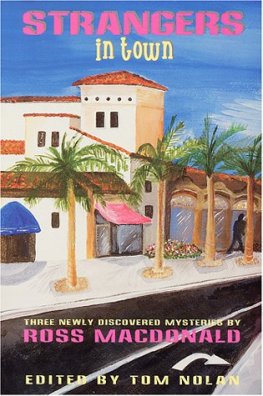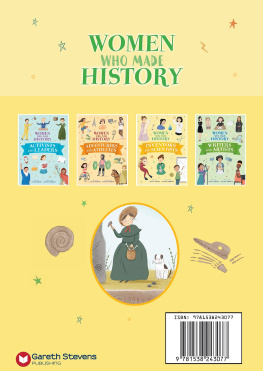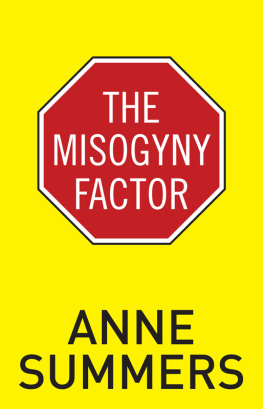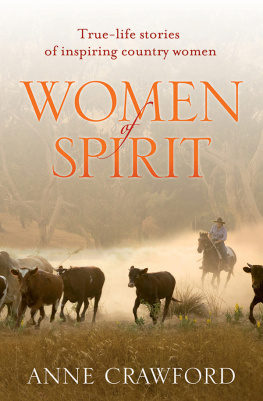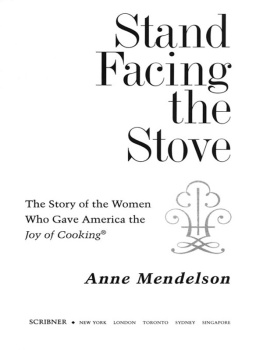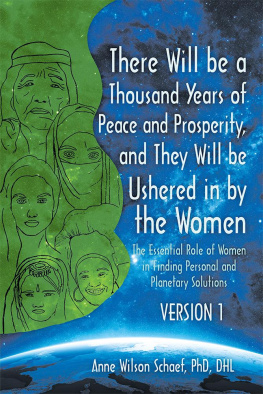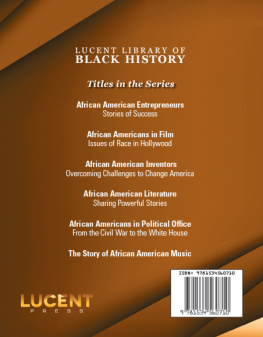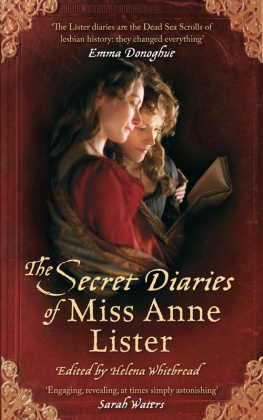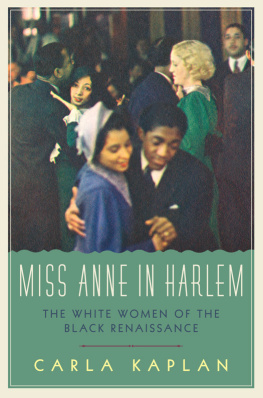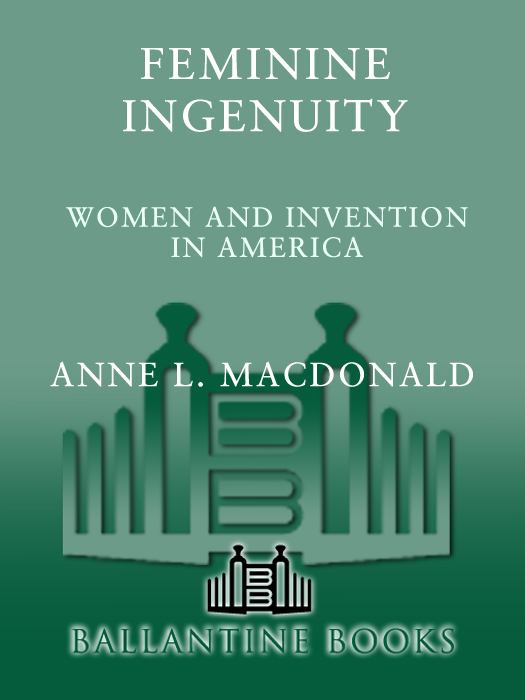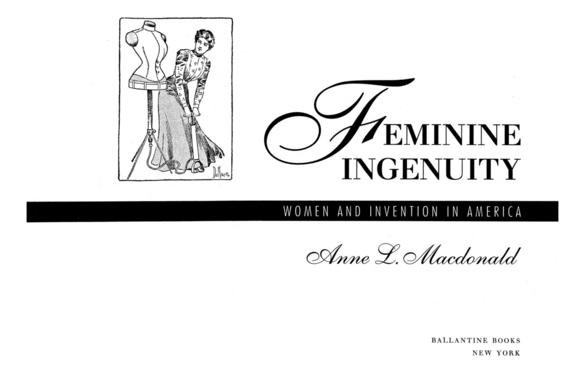A LIVELY AND LUCID MODEL OF SOCIAL HISTORY .
Her love for research and passion for her subject energize both text and reader. She introduces us to a cast of women inventors from colonial dames to movie stars to Nobel laureates who prove that the very American impulse to fix it and find resolutions is not gender-specific. This is a must read for students and teachers of womens studies, history buffs, and aspiring inventors.
Elizabeth Griffith
Author of In Her Own Right:
The Life of Elizabeth Cady Stanton
The most complete book yet on the subject A chronicle of womens struggle to show, first of all, that they can invent; second, that they always have; and third, that their inventions do not all have to concern housewares and clothing.
Invention & Technology
Well-written Fascinating Hard to put down. The honesty of presentation and thoroughness makes [the] topic come alive in a way that contributes vitally to womens history.
Dorothy L. Bristol
Archivist
National Womens History Project
Macdonald has written an informative, balanced and eminently readable book that blends facts, details and human-interest anecdotes to achieve a measured overall picture.
Rocky Mountain News
Feminine Ingenuity is must reading for every creative woman and every man who has a creative wife, daughter, mother, or sister.
Inventors Digest
Captivating A stimulating, highly readable contribution to womens studies.
Kirkus Reviews
ALSO BY ANNE L. MACDONALD
No Idle Hands
Copyright 1992 by Anne L. Macdonald
All rights reserved under International and Pan-American Copyright Conventions. Published in the United States by Ballantine Books, a division of Random House, Inc., New York, and simultaneously in Canada by Random House of Canada Limited, Toronto. Originally published in hardcover by Ballantine Books, a division of Random House, Inc. in 1992.
Library of Congress Catalog Card Number: 93-90466
eISBN: 978-0-307-77549-8
v3.1
Once again, for Peter
WE HOLD THESE TRUTHS
TO BE SELF-EVIDENT THAT
ALL MEN AND WOMEN
ARE CREATED EQUAL
Declaration of Rights and Sentiments
First Womens Rights Convention
Seneca Falls, New York, July 1920, 1848
CONTENTS
ACKNOWLEDGMENTS
T o many have helped me in the writing of this book that I hesitate to cite any lest I omit others. I wrote letters, placed calls, traveled miles, haunted reading rooms, explored library stacks, opened dusty boxes, and tracked leads and no one ever turned me down. Even stamped self-addressed envelopes I enclosed with written queries came back stuffed with reams of material or Sorry, I dont know, but have you tried ? Writers appended, Let me know what you find out! I hope that Feminine Ingenuity will accomplish just that.
At the National Archives, I am especially grateful for the help of Marjorie Ciarlante, Claudia Nicholson, and John Butler.
At the Smithsonian Institution, I relied upon Deborah Warner and Barbara Jansen at the National Museum of American History; at the Air and Space Museums library, on Brian Nichols and Chris King; at the Anacostia Museum, on Portia James for information on black women inventors.
At the Library of Congress, I am not only grateful for the shelf and desk space that Bruce Martin of Reader Services has made available to me but for his never-failing interest in the subject I have been pursuing. I cant say enough for the incredible research librarians, who combine their awesome knowledge of materials in the collections with a joyous determination to see that nothing comes between me and my quarry.
At the United States Patent and Trademark Office, Anne Kelly, Donald Kelly, Marion Canedo, Ruth Nyblod, Jane Myers, Commissioner Donald Quigg, Janice Pickering, Martha Crockett, Bernard Thomas, and James Davie have seen to it that I had whatever materials I needed.
Beyond Washington, many other institutions arranged for me to study there or sent me material: the Huntington Library in San Marino, California; the Schlesinger Library at Radcliffe College; the Baker Library at Harvard University Graduate School of Business Administration; the Atlanta Historical Society; the Cincinnati Historical Society; the Catholic University of Washington, D.C.; the New Jersey Historical Society; the Missouri Historical Society; the Georgia Department of Archives and History; the New York Historical Society; the Maine Historical Society, Portland; the Rennselaer County Historical Society and Lansingburgh Historical Society, Troy, New York; the Louisiana Historical Society in New Orleans; the Tennessee Historical Society, Nashville; Kimball House Historical Society of Battle Creek, Michigan; the Colorado Historical Society; the Ohio Historical Society, Columbus; the Hagley Museum and Library, Wilmington, Delaware; the General Electric Hall of History, Schenectady, New York; the Whittier Historical Society, California; the Searls Historical Library, Nevada City, California; the B & O Historical Society; the B & O Museum; the Wethersfield Historical Society; the Connecticut Historical Society; the Cincinnati Art Museum; and the Mannequin Museum.
These public and private libraries have been of inestimable assistance: Maud Preston Palenske Memorial Library in Saint Joseph, Michigan; Pennsylvania Historical Society Library; Mount Holyoke College Library/Archives; Goucher College Library; Chalmers Memorial Library, Kenyon College; San Jose Public Library; Brooklyn Public Library; Phillips County Historical Society, Helena, Arkansas; Nashville Public Library; Willard Library, Battle Creek, Michigan; Denver Public Library; Framingham Public Library, Massachusetts; Public Library of Charlotte and Mecklenburg Counties, Charlotte, North Carolina; Davidson College Library; Whittier Public Library, California; Carnegie Free Library of McKeesport, Pennsylvania; Moline Public Library, Illinois; Yuba County Library, Marysville, California; Public Library of Oakland, California; Kalamazoo Public Library; Three Rivers Public Library, Michigan; Davenport Public Library, Iowa; Library of the Association of American Railroads; Public Library of Springfield, Massachusetts; Monteagle Public Library, Tennessee; Birmingham Public Library and Jefferson Country Free Library, Alabama; Niles Community Library, Michigan; Ottumwa Public Library; Chicopee Public Library, Massachusetts; Pollard Memorial Library, Lowell, Massachusetts.
Individuals who have been especially helpful are Cliff Peterson, who owns the largest private collection of patent models; Fred Amram, who has been studying this subject for over a decade and is incredibly generous with his materials; Anne Whitehead, United States Department of Agriculture, Agricultural Research Service; and James W. Gandy, Oberlin Smith Society.
My literary agent, Leona Schechter, is always helpfulfrom concept to negotiation to creation.
I want to thank Michelle Russell, whose early enthusiasm for this book helped me begin it, and Ballantines editor-in-chief, Joelle Delbourgo, whose steadfast belief that I could pull it all togethereven after a violent storm wiped out half our house while I was at my computersustained me. For helping me so improve its final form, I am deeply grateful for the graceful touch and positive suggestions of my editor, Beth Rashbaum.


